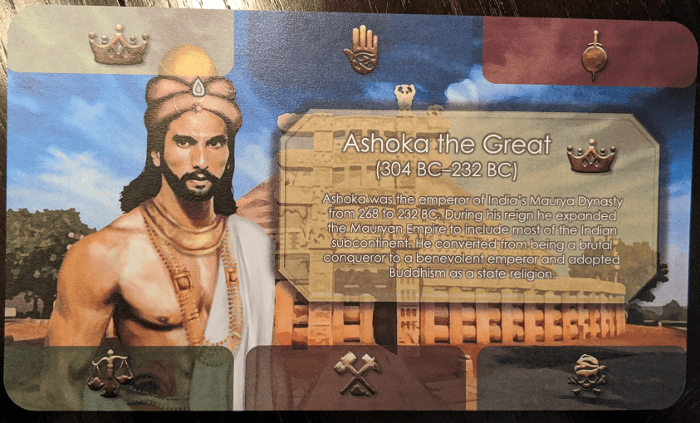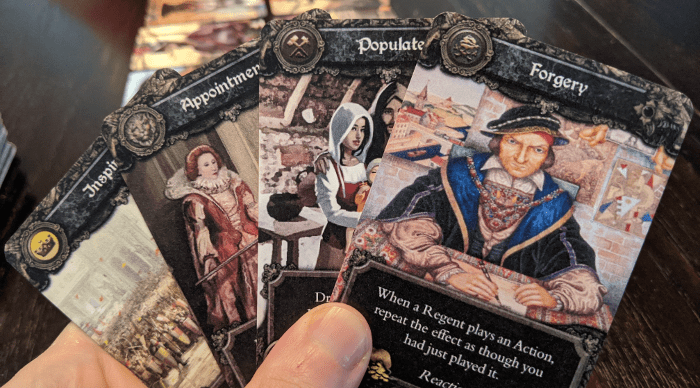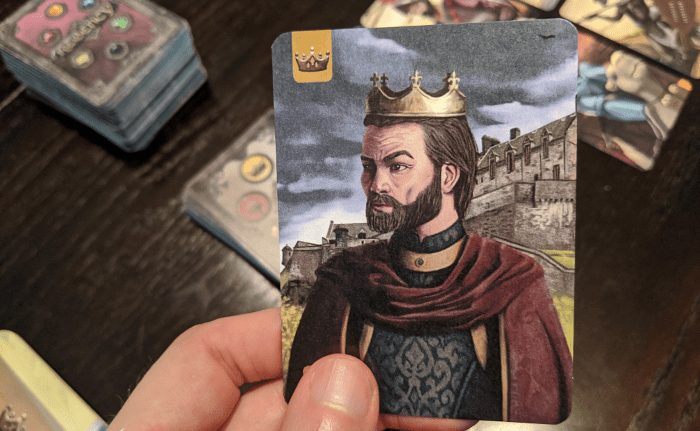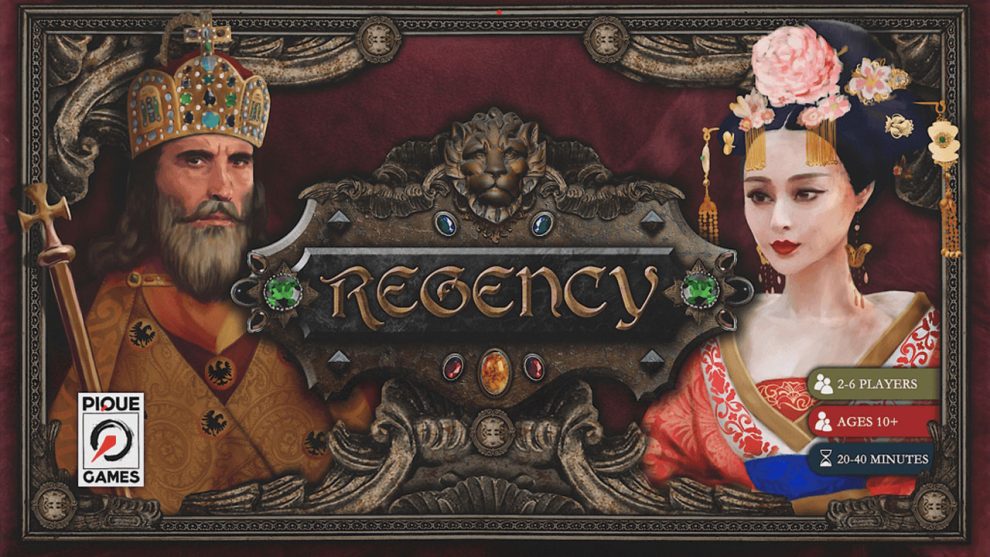Civilization themes feel like a cliche at this point. In just the past few years alone, we had games like Civilization: A New Dawn, Flow of History, Imperial Settlers, and Guns & Steel. Our game today follows in the same vein at first sight. Regency is a card-based game focused on the aggressive actions of historical figures instead of the usual civilizations doing more passive things like diplomacy or scientific research. To illustrate this point even further, every single historical figure you can play in this game is famous for conquest, colonization, and imperialism. Not only will you be able to play characters such as Atilla the Hun, Queen Elizabeth, or Alexander the Great, but also lesser-known ones in western media such as Ashoka the Great.
Even though I said this is a civilization themed game, it’s more of a coat of paint here. There is no map, tech tree, or wonders to build. The only components in this game are two decks of cards and player mats. If anything, it reminds me of card games in the late 90s and early 2000s where you had a complete card game in a small box.

Ruling Over Your Friends
Your goal here is a simple one: There are six Castes in your Fiefdom, and you need to fill them with Citizens that match the Caste to win the game. These Castes represent different social classes such as Nobles, Commoners, Merchants, and Military. Acquiring these citizens can be done either by using gold to attract them from the Populace deck or using Event cards from a randomly drawn hand to steal them from other players or the Populace itself.
The flow of the game is straightforward. On your turn, you will discard your Event cards as either gold to attract a Citizen card or as an Action card to use its special effect. You don’t have to play every single card, and you do have the option of discarding cards at the end of your turn. After discarding the cards, you draw up to a hand limit of 4. Any Reaction cards will be played out of turn, assuming they meet the requirements of the card. It’s that simple.
These Event cards have a gold value associated with them as well as a type of Caste the card belongs to. To play an Event card with a Caste icon, you need to have a citizen in that Caste, and each Caste has a very particular set of mechanisms associated with them. For example, Military event cards defend your hand or fiefdom while the Commoners allow the players to grow your population by drawing blindly from the Populace deck.
It makes the beginning and middle of the game interesting because you have to decide what Caste to focus on and what order to help you expand your Fiefdom. As you develop, more opportunities and actions open up for you to exploit. Maybe you are in a situation where your Brigands raided your friend’s hand, you take a Religious “Convert” event card from them, and you immediately use the “Convert” card to steal a citizen from your second friend.
On the other side of this coin, the end game isn’t engaging. Since everyone is on the same path to victory, it means that outside of the one or two castes that people are missing away from winning, everyone is going to have similar capabilities. It’s all going to come down to what the players drew and whether the players can play a card to stop your actions. You’ll find most of the cards in this game are focused on taking citizens from other players or preventing players from taking a citizen from the populace.

Take That Itself Isn’t Bad But…
Now before I continue, I do want to make one thing clear: I don’t have an issue with negative player interactions. This isn’t Rahdo Runs Through here. But, if a game implements these types of systems for players to fool around with, I want to examine the framing of those mechanisms, not the mere introduction of it.
You are also reading this from someone who likes games with engaging decisions, even for “light” or “filler” games.
If you are looking for twenty minutes full of “take that” gameplay in a free for all rumble done strictly through card play, Regency is going to fill that void with ease. I would even go so far as to say this is what Munchkin should’ve been.
Now that last sentence might conjure up feelings of disgust in some of you and if that’s the case, this game is not for you. Not by a longshot.
Those of you who are willing to indulge a bit more, let’s continue.
One of the first noticeable issues I had with this game is the cost of Citizens to attract them to your fiefdom. As I have mentioned before, each Event card in this game is worth gold that you will discard to invite Citizens from the row of cards. When I first read about this rule, I thought this was going to lead to a game where you have to evaluate the opportunity costs of attracting a citizen versus playing event cards. Sadly, I was wrong.
The “citizen market” is made up of six cards. The top row of three cards is not accessible to purchase but can still interact with event cards. The bottom row is cards you can buy, starting at the cost of 5 and ending with 7. Most event cards are worth 1 or 2 gold, while there are a few “Favor” cards that are worth 3 but have no ability whatsoever. In other words, to attract the cheapest Citizen to your Fiefdom, you will likely have to sacrifice around 3 or 4 cards from hand. Remember, your hand limit is 4.

Way Too Simple Choices
What this translates to is a game where you need to sacrifice several potent actions to attract the cheapest Citizen. Yet, this isn’t a safe method either since there are several Noble and Merchant Reaction cards that can completely interrupt this while making you lose the gold that you’ve just spent. The better option here would be to play the event card to get your citizens, since you only spend one card in your hand, instead of your entire hand.
I understand what the game is trying to say here. It is a game about historical tyrants known for bloodshed and conquest duking it out, so you should aim your sights towards other players. The problem I find with this setup is it doesn’t lead to provocative decision space.
What do I mean by this? I enjoy games where the decisions are plentiful and not obvious at higher levels of play. If I wanted to do a particular action, I need to consider the consequences, opportunity costs, and the outcome of my action. It should feel like the decision-making is rife with conflict but frustratingly enjoyable. This doesn’t mean complex. If anything, good game design will allow players to easily deduce what options are available to them and know the potential outcomes at first glance. To see good examples of this, I would point to games designed by Reiner Knizia such as Modern Art, Ra, and Samurai.
The problem with Regency is due to the high cost of attracting a citizen, your only viable option is to play a card. You look at your hand, check to see if you have the Castes to use them, and if you do, you pick your targets. Any Reactions you have, you must decide if they are worth keeping or if you can discard them in hopes of a better card draw for the situation. If this were a game design bingo, this type of system would be the free space.
It’s unfortunate that I feel this way because there are some elements I sincerely enjoy. The idea of filling your Caste slots to use a different set of actions is a very intriguing situation. Throw in a randomized Populace to attract to your Fiefdom, and you have to evaluate what type of role you will play on your table. Do you grab the Merchant citizen at the start that will allow you to snatch other player’s citizens by paying them off? Or do you want to pursue the Military first to defend your hand and fiefdom from early game nonsense? These are crucial decisions you have to make and create an implied narrative for yourself. If you want, you can be Queen Elizabeth of the Pirates. That is for you to enjoy.

Rocky End Game
It’s towards the end of the game that makes all of this feel muddy. When the game is very close to the end, everyone has similar tools. It boils the entire game down to playing a chain of cards to get the last few slots filled and hope nobody can play a Reaction card to break the chain. Since it is impossible to deduce the hands of other players, the only way to accurately know if what you have can be countered is by candidly playing it and crossing your fingers.
Another aspect that made me scratch my head was the historical figures. You would assume a game with various people to play would have an exclusive rule-breaking ability, but that wasn’t the case here. The only difference between them is their starting “prowess,” which is the Caste they can use via Event or Reaction cards without having a Citizen in that slot. It also begs another question as to why there are multiple figures for the same Prowess instead of just six player mats for the six Castes. The end result is that historical figures do not feel unique or differentiated at all.
The tragedy about this entire game is that I know what it is trying to accomplish. It is a game designed for a non-gamer audience as more of a gateway experience. It plays quickly within a twenty-minute to thirty-minute timeframe and it’s not deterministic, meaning everyone has a chance of winning instead of the most strategic player on the table. As someone who has been in the tabletop scene for far too long and played hundreds of games, Regency feels too familiar in the wrong ways with its back-to-back “take that” cards. It’s like attending an awkward high school reunion, reminding you why you never followed up with your former “friends” and ignored their requests on Facebook.
A print-n-play prototype was provided for this review.











Add Comment